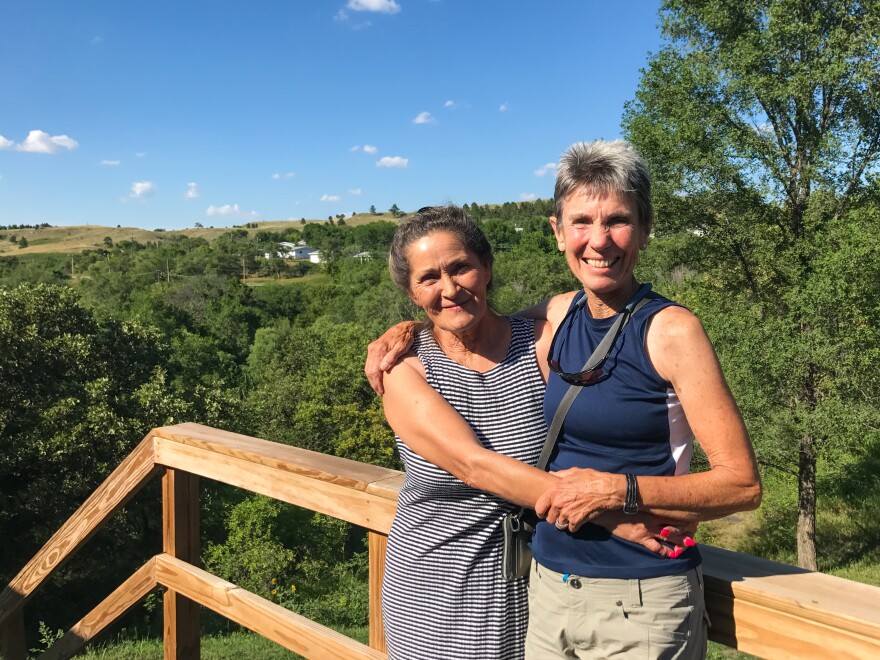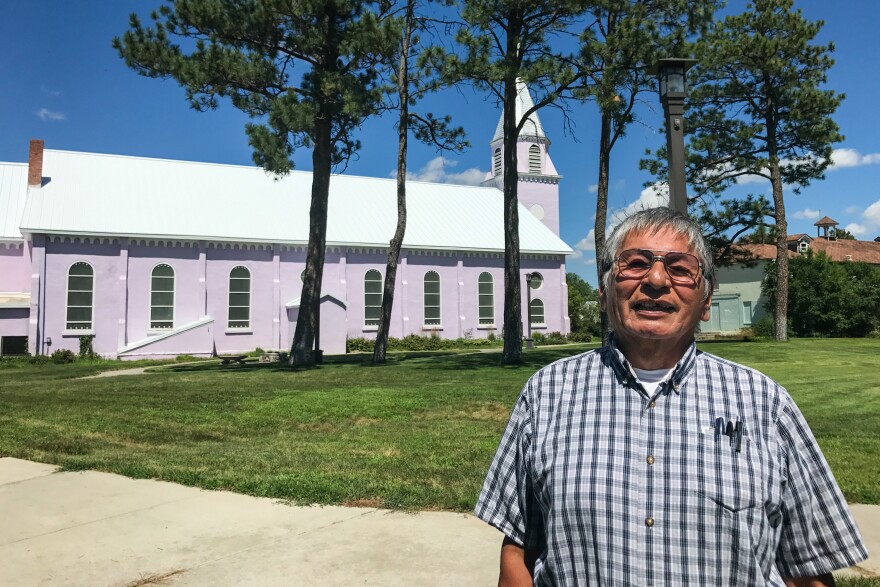NPR reporters are returning home this summer to the places where their families are from to see how they've changed — from the economy to schools to how people see their community and country.
I was born in a small town in Nebraska called Valentine but didn't stay for more than a few hours. It was the closest hospital to the Rosebud Indian Reservation over the state line in South Dakota where my family lived at the time.
My parents moved to South Dakota from the East Coast in the 1970s because my dad was working in community health and my mom landed a teaching job at the St. Francis Indian School — a Jesuit mission school whose school board had only just been turned over to Indian control.
The Rosebud is an isolated but beautiful place. The sky is huge, and the rolling prairie stretches out for miles. It's pocked with these little canyons that are lush with pine forests. My parents planned to stay for one, maybe two years, but they ended up here for five, before moving farther west to Montana. I was just a baby at the time, so I asked my mom, Jeannie Siegler, to travel back with me this summer.
It was an easy sell. Neither of us had been back to the reservation since 1986. But what we found wasn't always so easy to process. Things were tough back then, and they're even tougher now.

Back in the 1970s, one of the biggest problems on the Rosebud was alcoholism. Today, it's drugs. The reservation has been rocked lately by a drug epidemic – namely meth and fentanyl — and there are even more broken homes. The Rosebud Sioux Tribe says it has condemned more than 160 houses, exacerbating an already bad housing shortage.
"It's destroying families," says Jody Waln, a tribal member and family friend who has been a social worker for years.
Waln, 60, now runs a children's shelter in the town of Rosebud. Many of the kids were abandoned by parents battling addiction. The drugs touch everything: the housing shortage, the already alarming suicide crisis. Waln says they're also squeezing other tribal members' ability to access even basic health care.
"We're so overwhelmed with the immediate daily obstacles and struggles that there's no looking to the future," Waln says.
This was a problem back when we lived here, but it has gotten way worse now.
"There is this fallacy out there that because we're an Indian tribe and because we have these treaties from the federal government that all our needs are taken care of," says Wayne Boyd, treasurer for the Rosebud Sioux Tribe.
Waln arranged for us to meet Boyd and other tribal leaders, an interview that might have taken me days, if not weeks, to line up had this been a normal reporting trip.
Boyd and the others pointed to numerous bureaucratic tangles that they said also make it harder to deliver health care, attract new investment to build more homes and create jobs for the estimated 29,000 people living on the reservation. Recent estimates have put the unemployment rate on Rosebud well above 50 percent, one of the highest of any tribes in the country.
After a few days on the Rosebud Reservation, I noticed that folks listed many of the same problems I hear about in other places I travel on my beat covering rural America. They talk about the suicides, the drug abuse, the poor health care and doctor shortages, to name a few. It's just that on an isolated reservation, these are all magnified by 10.

The need is so great and the problems so overwhelming, it's hard to process.
"You can see life is still tough here for many people," my mom said, after one particularly heavy interview outside the children's shelter. "But there are a lot of good things that people do."
There is a century's or more worth of misunderstandings, broken treaties and promises that contribute to a wariness toward outsiders on some corners of this reservation. At a flea market in the largest town, Mission, Takisha Farmer, 18, told us that all the problems here tend to overshadow the good.
"We're all just trying to make it, and because of things in the past, we're still living this way," Farmer said.
She and her boyfriend, Kenyon Fast Horse, were selling wares to make some extra money for school. They're both students at Sinte Gleska University, the tribal college.
"There are gangs and there is all that here, but there are people who are going to college, [who] are getting off this reservations, [who] are valedictorians," Farmer said.
This is a touchy subject for young people on the Rosebud because there is a feeling that you have to leave the reservation to strive, yet at the same time, there is a cultural stigma that if you do that, you're abandoning your family and people.
Fast Horse said he is hoping to transfer to a university off the reservation. But he also has to take care of his mother here. He said people turn to drugs and alcohol out of despair. The only steady work is in construction, he added, and there is not a lot to do, no movie theater or bowling alley and very few parks.
"What are they going to turn to when they don't have nothing," Fast Horse said.
Many tribal elders will tell you that some of the systemic problems on the reservation can be traced back to the fact that people have lost touch with Lakota culture and tradition. After Native Americans were confined to reservations, many were forced to assimilate into white culture and were punished or worse if they spoke their own language and wore traditional clothing. On the Rosebud, one big change since the 1970s and earlier is that Lakota language and history is now widely taught in schools, and DVDs and online courses are available.

"Over the years, a lot of people lost their connection to their culture and their traditions," says Ben Black Bear Jr. "That may have been detrimental, probably why we have [so much] alcoholism and drugs."
Black Bear and his sister now teach Lakota across the reservation and beyond. He told us he thinks it's a good start toward addressing the bigger challenges here. The good-natured Black Bear has also begun the exhaustive process of modernizing the language to include words like email.
But some things will never change. Black Bear says the Lakota people on the plains were traditionally a closed society — they lived in close quarters in teepees, for one. So there is no word in Lakota for goodbye.
My mom and I decided to take that to heart, promising to return as soon as possible.
"We'll see you again," Black Bear said, grinning.
Copyright 2020 NPR. To see more, visit https://www.npr.org. 9(MDAxNDQ2NDAxMDEyNzU2NzM2ODA3ZGI1ZA001))




